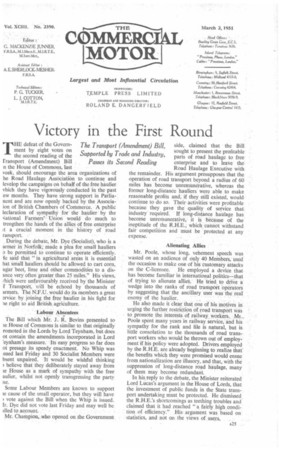Victory in the First Round
Page 27

If you've noticed an error in this article please click here to report it so we can fix it.
THE defeat of the Government by eight votes on The Transport (Amendment) Bill, the second reading of the Supported by Trade and Industry, Transport (Amendment) Bill . Passes its Second Reading n the House of Commons, last veek, should encourage the area organizations of he Road Haulage Association to continue and levelop the campaigns on behalf of the free haulier which they have vigorously conducted in the past ew months. They have strong support in Parlianent and are now openly backed by the Associaion of British Chambers of Commerce. 'A public leclaration of sympathy for the haulier by the gational Farmers'. Union wotild do much to trengthen the hands of the allies of free enterprise it a crucial moment in the history of road ransport. .
During the debate, Mr. Dye (Socialist), who is a armer in Norfolk, made a plea for small hauliers o be permitted to continue to operate efficiently. le said that "in agricultural areas it is essential hat Small hauliers should be allowed to cart corn, ugar beet, lime and other commodities to a disance very often greater than 25 miles." His views, rhich were unfavourably received by the Minister f Transport will be echoed •by thousands of armers. The N:F.U. would do its members a great .?,rvice by joining the free -haulier in his fight for le right to aid British agrieulture.
'Labour Absentees The Bill which Mr. J. R. Bevins presented to le House of Commons is similar to that originally romoted in the Lords by Lord Teynham, but does ot contain the amendments incorporated in Lord 'eynham's measure. Its easy progress so far does ot presage its speedy enactment. No Whip was sued last Friday and 30 Socialist Members were bsent unpaired. It would be wishful thinking believe that they deliberately stayed away from le House as a mark of sympathy with the free aulier, whilst not openly transgressing the party ne.
Some Labour Members are known to support te cause of the small operator, but they will have t vote against the Bill when the Whip is issued. Er. Dye did not vote last Friday and may well be tiled to account. '
Mr. Champion., who opened on the Government side, claimed that the Bill sought to present the profitable parts of road haulage to free enterprise and to leave the Road Haulage Executive with the remainder. His argument presupposes that the operation of road transport beyond a radius of 60 miles has become unremunerative, whereas theformer long-distance hauliers were able to make reasonable profits and, if they still existed, would continue to do so. Their activities were profitable because they gave the quality of service that industry required. If long-distance haulage has become unremunerative, it is because of the ineptitude of the R.H.E., which cannot withstand fair competition and must be protected at any expense.
Alienating Allies Mr. Poole, whose long, vehement speech was wasted on an audience of only 40 MeMbers, used the occasion to make one of his customary attacks on the C-licensee. He employed a device that has become familiar in international politics—that of trying to alienate allies. He tried, to drive a wedge into the ranks of road transpOrt 'operators by suggesting that the ancillary user was the real enemy of the haulier.
He also made it dear that one of his motives in urging the further restriction of road transport was to promote the interests of railway workers„ Mr., Poole spent many years in railway service, and his sympathy for the rank and file is natural, but is little consolation to the thousands of road transport workers who would be thrown out of employment if his policy were adopted. Drivers employed by the R.H.E. are already beginning to realize that the benefits which they were promised would ensue from nationalization are illusory, and that, with the suppression of long-distance road haulage, many of them may become redundant.
In his, reply to the debate, the Minister reiterated Lord Lucas's argument in the House of Lords, that the investment of public funds in the State transport undertaking must be protected. He dismissed. the R.H.E.'s shortcomings as teething troubles and claimed that it had reached "a fairly high condition of efficiency." His argument was based on statistics, and not on. the views of users. .




























































































